'Action needed to avert UK airfreight capacity crisis'

A Thames Estuary airport would add to the UK’s economic woes, as the country’s competitiveness continues to be compromised by the lack of capacity at Heathrow, according to Larry Coyne, CEO of all-cargo airline Coyne Airways.
The interim fix of a third runway is a must to prevent cargo capacity being frozen and the UK losing out to hubs in mainland Europe, he told guests at Coyne Airways' 20th anniversary celebrations in London last week.
Just under half of the UK’s exports by value go by air, with Heathrow already working at 98% flight capacity and processing around 65% of the UK's air cargo traffic.
“It is doubtful a ‘Boris Island’ solution would be available before 2030,” said Coyne.
“A modest cargo growth of three percent per annum between now and then would mean a further 51% cargo capacity would be needed to cope.
“That happens to be the amount of extra capacity in flight terms that Paris, Amsterdam, Frankfurt, and Madrid currently enjoy over Heathrow.”
He added that a Thames Estuary airport would be in the wrong place, putting a huge barrier, London, between the new hub and the nation's main source of manufacturing in the Midlands.
It would, he said, also spell disaster for the thousands of businesses set up around Heathrow to service the cargo industry.
“For many, it would entail writing off their investment in facilities extending all along the Thames valley, and either moving thousands of employees or recruiting and training new ones,” said Coyne.
“And where would the land come from to accommodate these enterprises close to an airport in the Thames estuary?
“All of the land needed for the terminals would have to be reclaimed at great expense, but its doubtful the project would be able to facilitate the needs of air commerce.
“There would not be sufficient land available on the banks of the Thames to accommodate the needs of companies wishing to be based close to the new airport.”
Coyne, whose airline provides scheduled services to some of the world's most difficult to reach destinations, called for the Government to take brave decisions to secure the future of air transport in the UK before any further damage is done.






